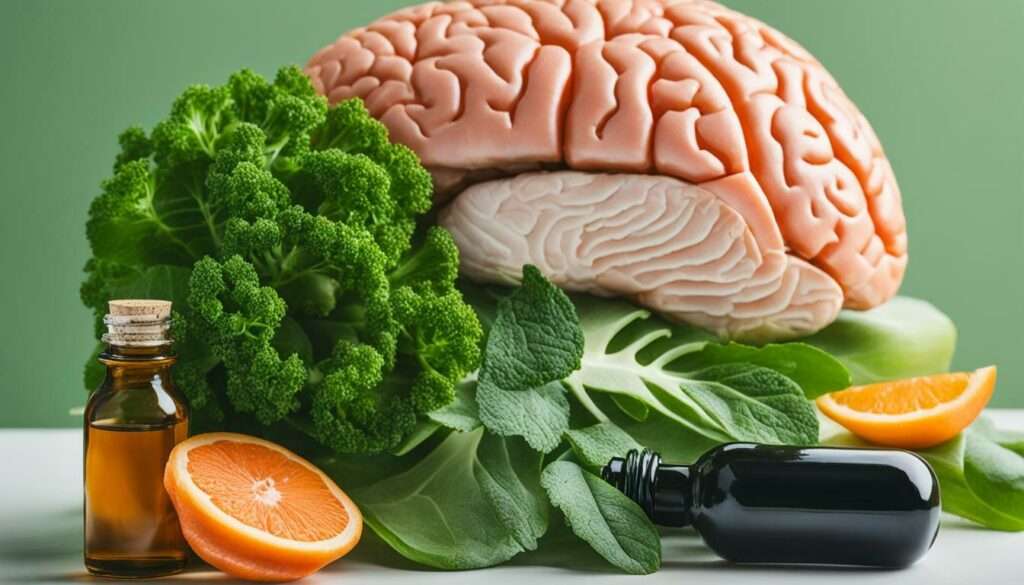Maintaining brain health is crucial for overall well-being. By incorporating the right vitamins and supplements into your diet, you can enhance cognitive function and support brain health.
Vitamins play a vital role in promoting optimal brain function and protecting against age-related decline. In this article, we will explore the best vitamins for brain health and how they can benefit your cognitive well-being.
- Vitamin B12 is essential for red blood cell production and nerve cell maintenance, protecting the brain from decline and potentially improving memory and cognitive function.
- Vitamin D deficiency has been linked to cognitive decline, and it plays a role in brain development and function, contributing to overall brain health.
- Omega-3 fatty acids, especially DHA, are crucial for brain health, supporting cognitive function, memory, and mood.
- Vitamin E is a powerful antioxidant that helps protect brain cells from damage, potentially lowering the risk of cognitive decline and Alzheimer’s disease.
- Vitamin C acts as an antioxidant, protecting brain cells from oxidative stress and potentially improving cognitive function and memory.
It’s important to note that these vitamins should be part of a well-rounded diet and healthy lifestyle. Consulting with your healthcare provider before starting any new supplement regimen is always recommended.
Key Takeaways:
- Omega-3 fatty acids, particularly DHA, are vital for brain health and function.
- They support brain development and improve cognitive function, memory, and mood.
- Natural brain health supplements provide a convenient and reliable way to incorporate omega-3 fatty acids into your daily routine.
- Choose reputable brands that place a high priority on sustainability and have received certification from independent bodies.
- Remember to maintain a balanced diet and a healthy lifestyle for optimal brain health.
The Role of Vitamin B12
Vitamin B12 is an essential nutrient that plays a vital role in maintaining brain health. Its benefits extend beyond red blood cell production and nerve cell maintenance, as it has been found to support cognitive function and improve memory.
As mentioned earlier, brain health supplements can provide the necessary vitamins to support cognitive function, and Vitamin B12 is a key ingredient in many of these supplements.
According to a study published in the journal Neurology, Vitamin B12 deficiency may lead to cognitive decline and memory problems, especially in older adults. The study found that individuals with low levels of Vitamin B12 had a higher risk of developing cognitive impairment compared to those with adequate levels of the vitamin.
In addition to its role in cognitive function, Vitamin B12 is also important for overall brain health. It helps in the production of myelin, a substance that surrounds and protects nerve cells in the brain.
Myelin helps facilitate the transmission of nerve signals and is crucial for proper brain function. By supporting the production of myelin, Vitamin B12 promotes optimal brain health and function.

To ensure you’re getting enough Vitamin B12 for brain health, include foods rich in this nutrient in your diet. Some good sources of Vitamin B12 include meat, fish, dairy products, and fortified cereals.
However, if you’re unable to consume adequate levels of this vitamin through your diet alone, brain-boosting supplements that contain Vitamin B12 can be a convenient and effective option.
In conclusion, Vitamin B12 is a vital nutrient for maintaining brain health. Its role in cognitive function, memory improvement, and myelin production makes it an essential ingredient in brain health supplements and a key component of a balanced diet for optimal brain health.
Consult with your healthcare provider to determine the best approach for incorporating Vitamin B12 into your brain health routine.
The Importance of Vitamin D
Vitamin D is not only essential for healthy bones but also plays a crucial role in brain health. Its role in brain development and function makes it a vital nutrient for maintaining cognitive function and supporting overall brain health.
Studies have shown that vitamin D deficiency is associated with cognitive decline and an increased risk of neurodegenerative diseases such as Alzheimer’s.
One of the primary functions of Vitamin D in the brain is to regulate the production of neurotransmitters, which are chemicals that transmit signals between nerve cells. It also helps to protect brain cells from oxidative stress and inflammation, both of which can contribute to cognitive decline.
Adequate levels of Vitamin D have been linked to better cognitive performance, improved memory, and a reduced risk of developing conditions such as dementia.
It is important to ensure that you are getting enough Vitamin D through sunlight exposure and dietary sources such as fatty fish, fortified dairy products, and supplements.

Here are some key brain health benefits of vitamin D:
- Supports brain development and function
- It helps regulate neurotransmitter production
- Protects brain cells from oxidative stress and inflammation
- Improves cognitive performance and memory
- Reduces the risk of neurodegenerative diseases
It is important to note that while vitamin D is beneficial for brain health, it should be taken as part of a balanced diet and healthy lifestyle. Consult with your healthcare provider to determine the appropriate dosage and ensure that it fits your individual needs.
Omega-3 Fatty Acids for Brain Health
Omega-3 fatty acids, specifically DHA, are essential for optimal brain health. Their positive impact on brain development, cognitive function, memory, and mood make them a crucial component of any brain health supplement regimen.
Research has shown that omega-3 fatty acids play a significant role in brain development, particularly during fetal development and early childhood. These essential fatty acids are necessary for the formation of cell membranes in the brain, ensuring its proper structure and function.
They also promote the growth and maintenance of brain cells, supporting overall cognitive function.

Omega-3 fatty acids are also known for their ability to improve memory and enhance cognitive function. Studies have found that individuals with higher levels of omega-3 fatty acids in their blood tend to have better cognitive performance and a reduced risk of cognitive decline and neurodegenerative diseases.
They have also been shown to support a healthy mood and reduce symptoms of depression and anxiety.
| Benefits of Omega-3 Fatty Acids for Brain Health |
|---|
| Support brain development and structure |
| Improve memory and cognitive function |
| Enhance mood and reduce symptoms of depression and anxiety |
| Protect against cognitive decline and neurodegenerative diseases |
To incorporate omega-3 fatty acids into your daily routine, natural brain health supplements are an excellent option.
These supplements are typically derived from fish oil or algae, providing a concentrated dose of DHA and EPA, the two most important omega-3 fatty acids for brain health.
“Omega-3 fatty acids play a crucial role in brain health, and supplementation can be an effective way to ensure you are getting an adequate amount. Consult with your healthcare provider to determine the right dosage and product for your specific needs.”
Why choose natural brain health supplements?
Natural brain health supplements offer a convenient and reliable way to boost your Omega-3 fatty acid intake. They undergo rigorous quality control processes to ensure purity and safety.
Additionally, these supplements often come in easy-to-swallow capsules or soft gels, making it simple to incorporate them into your daily routine.
When selecting a natural brain health supplement, look for reputable brands that prioritize sustainability and environmentally friendly practices. To ensure their quality and efficacy, choose products that have received certification from independent organizations.
Remember, Omega-3 fatty acids are essential for brain health, but you should complement them with a balanced diet rich in fruits, vegetables, whole grains, lean proteins, and other nutrients. A healthy lifestyle that includes regular exercise, adequate sleep, and stress management is also crucial for optimal brain function.
The Power of Vitamin E
Vitamin E is a powerful antioxidant that plays a significant role in brain health. Its ability to protect brain cells from oxidative stress and reduce the risk of cognitive decline and Alzheimer’s disease makes it a valuable ingredient in natural supplements for brain health.
Studies have shown that vitamin E supplementation may help improve memory and cognitive function, making it an essential nutrient for maintaining optimal brain health.

In addition to its antioxidant properties, Vitamin E also supports the health of blood vessels, which are essential for delivering oxygen and nutrients to the brain. By promoting efficient blood flow, Vitamin E helps nourish brain cells and support their proper function. It also aids in the maintenance of healthy brain cell membranes, which are crucial for optimal communication between neurons.
Vitamin E can be found in various natural food sources, including nuts, seeds, spinach, and avocado. However, for individuals who may not get enough of this essential vitamin through their diet alone, natural supplements for brain health are available.
These supplements provide a convenient and reliable way to ensure adequate intake of Vitamin E and other beneficial nutrients that support overall brain health.
The Antioxidant Benefits of Vitamin C
Vitamin C is not only known for its immune-boosting properties but also for its positive impact on brain health. Its antioxidant benefits, along with its ability to enhance cognitive function and memory, make it one of the top brain-boosting vitamins and essential vitamins for memory.
As a powerful antioxidant, vitamin C helps protect brain cells from free radicals and oxidative stress. It neutralizes harmful molecules and reduces the risk of damage to brain cells, promoting optimal brain health.
Additionally, vitamin C has been shown to support cognitive function and memory. It plays a key role in synthesizing neurotransmitters like dopamine and norepinephrine, which are essential for brain communication and mood regulation. By ensuring adequate levels of vitamin C, you can improve your cognitive abilities and enhance your memory.
| Vitamin C Benefits for Brain Health | How to Incorporate |
|---|---|
| Protects brain cells from oxidative stress and damage | Include Vitamin C-rich foods in your diet, such as citrus fruits, strawberries, bell peppers, and kiwi |
| Enhances cognitive function and memory | Consider Vitamin C supplements if necessary, after consulting with a healthcare provider |
So, if you’re looking to boost your brain health, don’t forget to include Vitamin C in your daily regimen. Whether through fruits, vegetables, or supplements, this essential vitamin can help you maintain mental sharpness and support your overall cognitive well-being.

The Importance of Vitamin K
Vitamin K is an often-overlooked nutrient when it comes to brain health, but its role in the formation of myelin and its potential to improve memory and cognitive function make it a valuable addition to any brain health nutrient guide. It is also recommended for neuroprotection.
Myelin is the protective covering of nerve cells, and Vitamin K plays a crucial role in its formation. By supporting the development and maintenance of myelin, Vitamin K helps ensure the proper functioning of the nervous system and enhances overall brain health.
Research has shown that Vitamin K may have cognitive benefits as well. A study published in the Journal of Nutrition found that higher dietary intake of Vitamin K1, the most common form of Vitamin K, was associated with better verbal episodic memory performance in older adults.
Another study published in the journal Nutrients reported that Vitamin K2, another form of Vitamin K, was linked to improved episodic memory and executive function in healthy adults.
| Vitamin K Benefits for Brain Health: | Studies and Research |
|---|---|
| Supports the formation of myelin |
Study: “The role of vitamin K in the nervous system: From development to aging” |
| Potential to improve memory and cognitive function |
Study: “Higher dietary vitamin K intake is associated with slower cognitive decline in older adults.” |
| Recommended for neuroprotection |
Study: “Vitamin K and the nervous system: An overview of its actions” |
If you’re looking to include more Vitamin K in your diet, good food sources include leafy green vegetables like kale, spinach, and broccoli, as well as certain oils, such as soybean and canola oil.
Supplements can also be an option, but it’s always best to consult with your healthcare provider before starting any new supplement regimen.

Incorporating Vitamin K into your brain health nutrient guide can have significant benefits for memory, cognitive function, and overall brain health. Whether through dietary sources or supplements, this often-overlooked nutrient deserves attention for its role in promoting neuroprotection and supporting optimal brain function.
Vitamin B6 and Brain Health
Vitamin B6 is a vital nutrient for brain health, thanks to its role in neurotransmitter production. Its ability to improve brain function and regulate mood and its inclusion in brain-support vitamin brands make it an important vitamin to consider for optimal brain health.

Vitamin B6, also known as pyridoxine, is involved in the synthesis of neurotransmitters, which are chemical messengers in the brain that regulate various functions, including mood, memory, and cognitive abilities.
It plays a crucial role in the production of serotonin and dopamine, two neurotransmitters that are essential for maintaining a balanced mood and promoting mental well-being.
Research suggests that Vitamin B6 deficiency may lead to cognitive impairment and mood disorders. Supplementing with Vitamin B6, either through diet or brain support vitamin brands, can help bridge the nutritional gap and support optimal brain health.
Foods rich in Vitamin B6 include poultry, fish, nuts, seeds, and bananas. However, for those who may have difficulty meeting their Vitamin B6 needs through diet alone, brain support vitamin brands provide a convenient and effective way to ensure adequate intake.
In conclusion, Vitamin B6 is a key nutrient for brain health and plays a vital role in neurotransmitter production. Its ability to improve brain function and regulate mood makes it an essential vitamin to consider for optimal brain health.
Whether through a balanced diet or brain support vitamin brands, incorporating Vitamin B6 into your routine can help support and maintain a healthy brain.
Balanced Diet and Healthy Lifestyle
While vitamins play a crucial role in supporting brain health, it is important to remember that they should be part of a balanced diet and a healthy lifestyle. This is especially important for elderly individuals, as their nutritional needs may differ from younger adults.
A well-rounded diet consisting of nutrient-dense foods can provide the vitamins and minerals necessary for optimal brain function.
Investigating the efficacy of brain vitamins is essential, as not all supplements may be beneficial for everyone. It is recommended to consult with healthcare providers before making any changes to supplement regimens. They can assess individual needs and provide guidance on the appropriate types and dosages of brain vitamins.
Additionally, maintaining a healthy lifestyle can significantly contribute to brain health. Regular exercise, adequate sleep, stress management, and social engagement are all important factors that can support cognitive function. These lifestyle choices can help reduce the risk of age-related cognitive decline and neurodegenerative diseases.
| Key Points: | Takeaways: |
|---|---|
| 1. A balanced diet is crucial for brain health. | – Include nutrient-dense foods in your diet – Consult with healthcare providers for personalized guidance |
| 2. Investigate the efficacy of brain vitamins. | – Not all supplements may be beneficial for everyone – Seek professional advice before starting any new regimen |
| 3. Maintain a healthy lifestyle. | – Regular exercise, adequate sleep, stress management, and social engagement are beneficial – These lifestyle choices can reduce the risk of cognitive decline |
By prioritizing a balanced diet and adopting a healthy lifestyle, individuals can nurture their brain health and maintain cognitive function as they age. Remember, the key to optimal brain health lies in a holistic approach that encompasses nutrition, physical activity, and overall well-being.
“The food you eat can be either the safest and most powerful form of medicine or the slowest form of poison.” – Ann Wigmore
Conclusion
In conclusion, vitamins are essential for maintaining brain health and supporting cognitive function. Incorporating the best vitamins for brain health into your diet and lifestyle choices can have a positive impact on cognitive function, memory, and overall brain health.
Remember to consult with your healthcare provider before starting any new supplement regimen.
FAQ
Q: What vitamins are best for brain health?
A: Some of the best vitamins for brain health include Vitamin B12, Vitamin D, Omega-3 fatty acids, Vitamin E, Vitamin C, Vitamin K, and Vitamin B6.
Q: What is the role of Vitamin B12 in brain health?
A: Vitamin B12 is essential for the production of red blood cells and the maintenance of nerve cells. It helps protect the brain from age-related decline and may improve memory and cognitive function.
Q: How does Vitamin D support brain health?
A: Vitamin D plays a role in brain development and function. It may help preserve brain health as you age and reduce the risk of cognitive decline and neurodegenerative diseases.
Q: How do Omega-3 fatty acids benefit the brain?
A: Omega-3 fatty acids, especially DHA, are important for brain health and development. They have been shown to improve cognitive function, memory, and mood.
Q: What does Vitamin E do for the brain?
A: Vitamin E is a powerful antioxidant that helps protect brain cells from oxidative stress and damage. It may lower the risk of cognitive decline and Alzheimer’s disease.
Q: How does Vitamin C contribute to brain health?
A: Vitamin C is an antioxidant that helps protect brain cells from free radicals and oxidative stress. It may improve cognitive function and memory.
Q: Why is Vitamin K important for brain health?
A: Vitamin K helps with the formation of myelin, the protective covering of nerve cells. It may improve memory and cognitive function.
Q: What is the significance of Vitamin B6 for brain health?
A: Vitamin B6 is involved in the production of neurotransmitters, such as serotonin and dopamine, which are important for mood regulation and cognitive function.
Q: Are vitamins enough for brain health?
A: While vitamins can support brain health, they should be taken as part of a balanced diet and healthy lifestyle. Consulting with a healthcare provider before starting any new supplement regimen is important.






